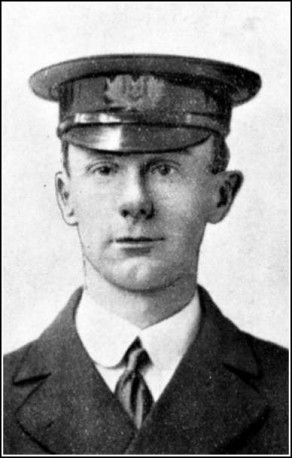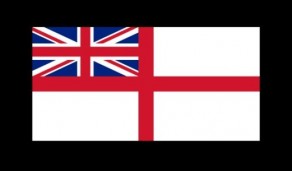09 October 1914
A SETTLE MAN MISSING
Although Settle has contributed a fair number of men in the Army and Navy, Mr. George Edward Turner is the first to give his life for his country. Mr. Turner has been reported amongst those missing after the sinking of the ‘Hogue’ three weeks’ ago.
Mr. Turner, from boyhood, worked at the Settle Post Office, being well known and highly respected. He was latterly a telegraphist, and about two years ago entered the employ of the Castle Line as a wireless operator. On the call for operators for the Navy he volunteered his services, and was transferred to the ‘Hogue’. He had not been many weeks with the fleet when he lost his life. He was the son of the late Mr. Robert Turner, of Settle, and was a member of the Parish Church Choir and of the Settle Amateur Operatic Society. Much sympathy is felt for Mrs. Turner and the family.
24 December 1915
CRAVEN’S ROLL OF HONOUR – SETTLE
George Edward Turner, Marconi operator on H.M.S. ‘Hogue’, sunk by German submarine. Elder son of the late Mr. Robert Turner of Rock House, Settle, and of Mrs. R. Turner, Harrogate. For many years employed in Settle Post Office.
04 January 1918
SETTLE’S FALLEN HEROES
Memorial Service at the Parish Church
A memorial service for the Settle soldiers who have fallen in the war was held at the Parish Church last Sunday afternoon. There was a large congregation, and the service was conducted by Rev. W. E. Linney (vicar). The hymns ‘God of the living in Whose eyes,’ ‘Jesus lives,’ ‘On the resurrection morn,’ and ‘ O God our help in aged past’ were sung, and the ‘Last Post’ was sounded at the close of the service by two of the local Cadets. The organist (Mr. F. Lord) also played appropriate music as the congregation assembled and left the church.
The Vicar, in the course of his sermon, said they were met to remember the Settle soldiers, men, and boys – some indeed little more than boys – who had laid down their lives for the country at the war, whether during the year which was just drawing to a close or in the earlier stages of the conflict. When he asked them to remember those heroes that day, he knew that he was asking them to do what they were always doing. They were their own dear ones united to many of them by ties of blood – husbands, fathers, brothers, sons, as well as friends. How could they forget them? Were they not reminded of them day by day by the gaps in their home circles, which could never again be filled by them? They all desired in their hearts that God would bless and keep them, and give them peace. and happiness. The Vicar then read the following list of the Settle men who had laid down their lives:– John Edward Bell, Geo. S. Belles, Fredk. Baldwin, John Barrett, Robert Bateson, William Bradley, Frank Bulcock, George R. Bullock, Herbert Clark, John Cokell, Edward Ellershaw, Jas. Ewart, Wm. Ewart, Fredk. Frost, Harold Goss, Alfred Gower, Joseph Lord, John Morphet, John Packard, Chas. Peachey, Thomas Howarth Preston, Albert Ralph, Thos. Stackhouse, George Edward Turner, Derwent Turnbull, Wm. Troughton, Harry Walton, John Edward Wilson, Ernest Wooff, and Robert Wooff. Proceeding, the Vicar said they had a responsibility with regard to those men. They owed them a debt, and he trusted and believed that they were wishful to do all that they could to repay it. “ Our lives are being saved by their death. If we have any future before us on the earth it is because they gave up their futures to secure it. Their right to survive was as good as our own. Many of them would have been of far more use in the world than we can hope to be. The future stands to be only poorer for our surviving in their stead. We are debtors to them for all they have given us. To the future think of all it has lost in them.” How were they going to pay the debt, and in paying it to honour their heroic dead? Surely there could be but one answer – to live to give effect to their ideals. When they were asked what those ideals were, they might be well put in the words of Bishop Walshaw How’s hymn written for the diamond jubilee of Queen Victoria, “To make the world a better world for man’s brief earthly dwelling.” If Prussian militarism should gain the ascendancy the world would be scarcely a fit place to live in. What they wanted was the triumph of right and liberty. That was the task they had begun, and many of them, fired by the enthusiasm of a noble cause, literally went singing to their death. The old life which had no loftier aim than a high standard of material comfort had been felt to be unsatisfactory. To ardent youth the higher spirit of self-sacrifice, which was the spirit of Christ, beckoned onward with irresistible attractiveness, and they followed the gleam. They had yet to complete the great task to which they dedicated themselves. That was the way they could honour the memory of their fallen heroes, and with confidence that they had not died in vain.
A collection taken on behalf of the Red Cross Society realised £5 15s.








No comments yet.